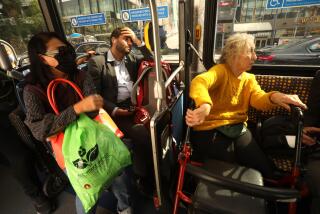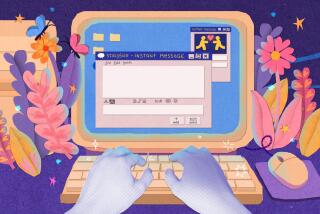A decade later, returning to the scene of something unfathomable
When Vincent Bury pulled up to my New York hotel last month, it had been nearly 10 years since my last ride in his yellow taxi.
“I remember you like it was yesterday,” Bury said.
There were things still fresh in my memory, too. The all-night sobbing of the person in the hotel room next to mine. The grieving stranger, in search of his missing daughter, who hugged me in a city park and made a tearful plea for help. I remember slumping onto a bench the first time the adrenaline slowed and the enormity of the suffering and loss hit me.
Full coverage: A decade after 9/11
In 2001, I flew with colleagues in a chartered plane from Los Angeles to New Jersey, two days after the attacks. I dropped my bag in a Manhattan hotel room and hailed a cab, driven by Bury, who was then 48. He drove as close to the collapsed World Trade Center towers as we could get, through smoke and dust and streets teeming with rescue workers, volunteers and people searching for lost loved ones.
“Look at this. Just look at this,” Bury said in September of 2001 as we approached Lower Manhattan, the scent of death and destruction sharp. “That used to be a beautiful sight of the towers, but I’m going to tell you something. You see all these people out here? Everybody helping out in whatever way they can? They tried to break us up, but this city’s never been more unified.”
And now I was back.
I checked into a hotel across the street from where the jets went into the towers, where innocent thousands lost their lives on a day that began like so many others until the planes roared low over the city. I called Bury, a native New Yorker who’s been a cabbie for 26 years, and he agreed to come pick me up for a reunion of sorts. I wanted to feel what I felt that night, see how his life had changed, and better understand how mine had changed.
We smiled and shook hands. Now 58, he looked much the same, though with less hair and more gray. He drove us along West Street, past the cranes that maneuver like muscled arms above the construction zone. New towers are rising near the site of the old ones in a defiant statement of resolve and renewal. Gawkers, tourists and the curious still come with cameras, with disbelief, with fear, with hope, with respect for the dead and admiration for those who tried to save them.
Prior to last month, I had done what many of us have done, for the sake of sanity if not convenience. I had pushed Sept. 11 into the recesses of memory, back to a place where uncomfortable or unfathomable things are stored.
That’s not hard to do if you reside in California, a continent away from the heat of that day. But being back in New York, where I lived before moving to Los Angeles in May of 2001, brought the catastrophe closer. Close enough to be reminded that we all have a stake in what happened that day and in the days that followed.
The numbers are staggering.
FOR THE RECORD:
Hijacked jetliners: In the Sept. 11 Section A, Steve Lopez’s essay on the anniversary of Sept. 11, 2001, said three jetliners commandeered by hijackers went down in New York, Washington and rural Pennsylvania. Four jetliners were hijacked that day. —
Three jetliners commandeered by hijackers went down in New York, Washington and rural Pennsylvania, killing nearly 3,000 people and injuring more than 2,300.
In New York, 343 firefighters and 75 cops perished.
Two wars, started in response, are still being fought. More than 4,600 American servicemen and women have died, tens of thousands more have been injured or permanently maimed, and for some, the invisible wounds will never heal. Estimates of civilian deaths and injuries in Iraq and Afghanistan range into the hundreds of thousands.
The U.S. cost of those wars is counted in the trillions, and we spend $75 billion a year on domestic security, including millions in remote locales. We’ve handed police greater power to intervene in our lives. Grandmothers are searched at airports, children’s stuffed animals inspected, nail clippers confiscated.
And are we safer for all that? Wiser? This early in the story, all that’s clear is that some of the world we thought we knew went up in smoke 10 years ago, when iconic symbols of wealth and power exploded and the survivors ran screaming into the streets.
From Vincent Bury’s cab, I gazed up at the replacement towers and shuddered at the memory of people leaping to their deaths from the sky, choosing obliteration over incineration.
Bury sees the events of Sept. 11 as “a wake-up call to mankind,” a reminder that each of us has a responsibility to “contribute some light.”
“Live now, as if it’s everything,” said Bury, who practices yoga and speaks like a Beat poet. “The moment is precious.”
Ground-breaking philosophy? No, but it’s the thing we’re all in search of: a survival guide. A way to breathe in a world of suffocating peril. A way to move forward.
::
One place I wanted to revisit was Union Square, where 10 years ago I had met Dick McCloskey of South Bend, Ind. He was with his family then, looking for his daughter, Katie, a recent college graduate and New York transplant who was thrilled that she could see the Statue of Liberty from her office on the 97th floor of the north tower. In Union Square, Dick McCloskey carried a flier with his daughter’s image, hoping to find someone who had spotted her alive. He had given a DNA sample earlier, in the event they found his daughter’s remains.
With tears welling, he hugged me and said, “Say good things.”
I spoke to McCloskey again this past May, when Navy SEALs killed Osama bin Laden. The Al Qaeda chief had gloated about the annihilation of Katie McCloskey and all the others, but McCloskey told me Bin Laden’s death wasn’t something he cared to dwell on. “Our focus has been much more on trying to make something positive come out of 9/11,” he said, telling me that a ninth student at his daughter’s former high school had just been given a college scholarship in Katie’s name.
“I’m glad they’ve rid the world of this monster,” he said of Bin Laden, “but we’re never going to win a war on terror through violence.” And to those who were inclined to celebrate, he said, “I’d rather see them do that by doing something good for someone today.”
That kind of generosity is an inspiration, and surprisingly common among the survivors I’ve talked with.
From my hotel, I called the relative of a friend. Mike Sweeney answered the phone at his home in suburban Boston and told me his story.
Early on the morning of Sept. 11, he got a call from his wife, Amy. She was feeling low about being at work and missing out on a chance to see their daughter, a kindergartner, off to school. Sweeney, a cop, talked her through it. There’d be plenty of chances to take Anna, who was almost 6, and Jack, 4, to school. Amy Sweeney, a flight attendant, took off from Logan International Airport shortly after that conversation on American Airlines Flight 11, headed for Los Angeles.
On his way to work later that morning, Sweeney got a call from an American employee in Dallas, asking if he’d heard the news about a plane going into a tower.
He later learned that his wife had called flight management services in Dallas to report the hijacking and the seat numbers of the hijackers. “I see water and buildings,” she said as Flight 11 went into rapid descent, according to an FBI document. “Oh my God! Oh my God!”
“The first thing I had to do was pick up the kids,” said Mike Sweeney. “I said, ‘Guys, today’s a real tough day. Mommy was in a plane crash and died.’ Anna goes, ‘What?’”
Mike Sweeney said Anna wanted to know if other people were hurt. Yes, he told her. They died, too.
The kids had lots of questions: Why would someone fly a plane into a building? Where was their mother now? If she was in heaven, why didn’t she just come home?
Mike Sweeney didn’t have answers or explanations that made sense to him or his children. But he has tried to help them understand that, while there are good and bad people in the world, the good outnumber the bad.
He felt some sense of justice in the U.S. killing of Bin Laden but has mixed feelings about the reasons and effects of two wars. And though he and his children try not to dwell on the past, he wishes schools devoted more attention to Sept. 11. “People don’t know what to do as far as putting it into its place in history,” he said.
Some of Madeline Amy Sweeney’s remains were found in August of 2002.
“We had them flown up here for a burial,” said Sweeney, who retired from the police force in order to raise his kids. “Unfortunately, we found out two and a half years later that they had found some more. I wasn’t going to dig up her grave, but it was a significant portion of her body, so we had to go through it all over again.”
::
Roberta “Robbie” Morell of suburban New York is another friend of a friend. Her husband, George, was at work in the north tower, perhaps not far from the spot where Amy Sweeney’s plane hit. George worked for Cantor Fitzgerald and was one of 658 employees the company lost that day. He left behind Robbie and their four children.
There’s grief and depression, said Robbie. Complicated, unresolved grief that just accumulates. There’s anger, irritability, uneasiness, depending on the day. She “disassociates” from news of Bin Laden or the wars, she said, because it’s hard for her to deal with retaliation or revenge, which only open the wounds all over again.
And it’s not just her own issues she’s dealing with. Her four kids, ranging in age from 16 to 24, are also working out the loss in their own ways, on their own schedules. And then there are the anniversaries to deal with, the public, annual revisiting of the historic event that tore up their family.
“The void, you just adjust to it,” she said, but the adjusting is forever. “One of my best friends lost her husband, too, so the support group is helpful.”
Robbie told me she met George when they both worked on Wall Street, but while he was still alive she got a job as an educational aide with the idea of becoming a school counselor so she could fit her schedule around that of her children. After George died, she went back to school for her master’s. Wall Street, she said, was “about taking, about what you can get. I wanted to give.”
Rather than a school counselor, she became a mental health counselor. When I contacted her she was at her office, where she works with people who have both a mental illness and an addiction.
Some parallels exist between what she’s going through and what her clients are going through, she said. They are both in a process of “recovery,” which means, essentially, working toward a life of hope and meaning despite limitations that may never lift.
“Hopefully the end of grief is acceptance,” she said, explaining that she is trying to understand her “life as it is, and to accept it.”
::
Near my hotel, just a couple of blocks from ground zero, I noticed a mosque that had constant police surveillance outside. One day, I spoke with a man who was leaving after lunchtime prayers.
Ten years ago, he was 15 years old and living in Pakistan. He couldn’t relate to the attack or the attackers, he said, nor did he understand their motives or objectives. As he grew older, he wanted to work in business and wanted to do so in New York.
When we talked, he had been in Manhattan only a month and at 25 was living his dream, working in risk management for Deloitte, where he said he had been warmly welcomed.
Maybe there’s hope. Maybe, despite what the extremists on both sides would like us to believe, it’s possible to consider a world that extends beyond the block or the border and to seek out similarities rather than politicize differences. But at times that still seems a distant prospect. Ten years after religious fanatics tried to destroy us, we have American politicians who trumpet a kind of religious fervor that sounds suspiciously like bigotry.
::
Just after 9/11, it seemed a certainty that we would examine our lives, our values, our place in the world. Yes, we wanted the killers hunted and brought to justice for their unspeakably heinous acts. But we also shared a new awareness of our vulnerability. Some of us even thought we were going to live less materialistically, at least until we got the order from the commander in chief to resume shopping as soon as possible, so the terrorists didn’t win.
But now we’re 10 years down a road littered with tens of thousands of bodies, and we have no clue where to turn next.
In New York, I met a Malibu couple — Craig Stanman and Phoebe Sarason — who had come to ground zero to pay their respects, and they, too, thought we’d lost our way after 9/11. Sarason told me she was so personally shaken by the attacks, she quit her teaching job in Pasadena because she wanted to spend more time with family and because she feared that downtown Los Angeles could be the next target. With time on her hands, she began reading the history of American foreign policy, searching for a better understanding of the motives for the attacks.
For all the great humanitarian acts of intervention and aid around the world over the years, she said, U.S. meddling for economic or political self-interest was precisely the kind of thing that had bred hatred. And the arrogance of declaring war in Iraq, which had nothing to do with 9/11, was only the latest example.
True enough. Calling drones peace-keepers, even when they accidentally kill innocent civilians, doesn’t do much to quell the teeming hatred, which is directed not at our freedoms but at our actions. And as for all the talk of shrinking government, why is there so little mention of the crippling cost of waging simultaneous wars the public has grown tired of and uninterested in, even as casualties mount?
::
On a stormy evening, Vincent Bury drove north along the Hudson, past the Midtown skyscrapers and all the way up to 100th Street and Riverside Drive. We had visited the Firemen’s Memorial 10 years ago, a broad sarcophagus with marble sculpture and an etching of galloping horses hauling a fire engine, and now we were visiting it again.
I told Bury about Dick McCloskey asking me to say good things, and about how he had committed himself to simple acts of generosity in his daughter’s memory.
“That’s amazing,” Bury said, “that he could lose his daughter and find something positive in such a terrible tragedy.”
I don’t know that I could have found the grace and resolve that McCloskey, Mike Sweeney and Robbie Morell have found. But I believe that we owe them, their families and their lost loved ones something.
It begins with the tolerance and reverence for life that Bury spoke of, but it’s more than that. We owe them reflection, civility and humility. We owe them a greater understanding of our own history and more curiosity about the rest of the world. We owe them an insistence on a more intelligent and constructive political conversation. We owe them greater scrutiny of the way we live, the natural resources we use, the wars we fight and the impact on the world.
Vincent Bury couldn’t find a parking place, of course, so he pulled over to the curb and popped the hood so any passing cop would think he had car trouble. He pulled a candle out of a bag on the seat beside him. “Brought it from home,” he said.
Bury read aloud the inscription on the rain-slicked monument, a tribute to those lost “in a war that never ends.”
He lit the candle, held it high and said, “To the best in all of us.”
Full coverage: A decade after 9/11
More to Read
Start your day right
Sign up for Essential California for news, features and recommendations from the L.A. Times and beyond in your inbox six days a week.
You may occasionally receive promotional content from the Los Angeles Times.







